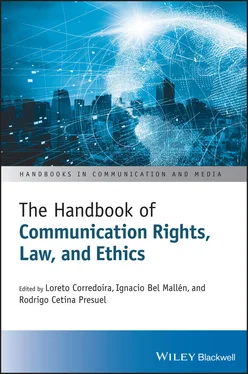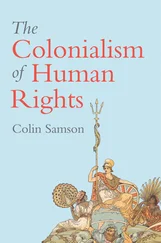5 Desantes Guanter, J.M. (1977). Fundamentos del derecho de la información. Madrid: Fondo editorial Cajas de Ahorros.
6 Desantes Guanter, J.M. (1999). Francisco de Vitoria, precursor del derecho de la información. Madrid: Imatique.
7 Fernández, R. (ed.) (2003). Los derechos Humanos. Antología de Francisco de Vitoria. Salamanca: Editorial San Esteban.
8 Nussbaum, M. (2003). Capabilities as fundamental entitlements: Sen and social justice. Feminist Economics 9 (2–3): 33–59.
9 Paine, T. (1791). The Rights of Man. London: J. Johnson.
10 Sánchez Ferriz, R. and Corredoira, L. (2017). La compleja configuración de un derecho-libertad poliédrico, el Derecho a la información.: Referencias históricas. Revista de derecho político 99: 11–48.
11 Subedi, S. (2017). The Effectiveness of the UN Human Rights System: Reform and the Judicialisation of Human Rights. London: Routledge.
12 Suksi, M., Agapiou-Josephides, K., Lehners, J.-P. et al. (eds.) (2015). First Fundamental Rights Documents in Europe. Cambridge, UK: Intersentia.
1 1See the various studies on Francisco de Vitoria, who promoted human rights in the early sixteenth century. José María Desantes considers him the first precursor of communication rights in his work Francisco de Vitoria, precursor del derecho de la información, 1999, especially pp. 35–68. See also de Vitoria’s work published by Ramón Fernández in 2003, Los derechos Humanos. Antología, particularly pp. 242–243. De Vitoria did not write directly; his legal work Lectiones has been handed down to us from his students.
2 2See, for example, Suski et al. (2015).
2 Dignity, a Revolutionary Principle in a Cosmopolitan Society
Javier Gomá Lanzón
Dignity is the most revolutionary concept to come out of the twentieth century. It is endowed with such transforming power that the mere mention of it, as if it were a magic word, has been enough to overcome enormous obstacles that have held back the moral progress of humanity. In the past few years, it has advanced dramatically. And yet, in spite of the extraordinary influence of this concept, philosophy, strangely enough, has simply ignored it for the last two centuries. It has never been a subject of philosophical reflection.
It might be said that this omission is strange because this concept escapes the boundaries of philosophy and is present in innumerable aspects of life, including many different legal contexts. Indeed, an in-depth discussion of it as a philosophical concept is particularly pertinent for a volume that focuses on the universalization of rights. For dignity, in addition to being the foundation of equality, is a sine qua non for the enjoyment of freedom. And the concept was incorporated in twentieth-century international law’s most important texts. It can be found, for example, in the Preamble of the Charter of the United Nations (1946), the Preamble and Article 1 of the Universal Declaration of Human Rights (1948), the Preamble and Article 1 of the International Convention of Civil and Political Rights (1966), and the Preamble and Article 1 of the Charter of Fundamental Rights of the European Union (2002).
In this book, authors such as Corredoira, Bel, and Abad analyze the main international documents that, in the context of communication and the exercise of freedoms, have inspired its subtitle: Seeking Universality, Equality, Freedom and Dignity .
Dignity is the inspiration of countless ethical debates, such as those that arise in the field of bioethics (abortion, euthanasia, genetic manipulation, and cloning). Among many others, it is at the origin of social causes like trade unionism, feminism, or animalism. And, as recently as the present century, it triggered the social movement of the indignados (the indignant), though those involved felt no need to define, even in simple terms, what it was that provoked their wrath and brought them onto the streets in protest.
Schopenhauer summarily dismissed the Kantian concept of dignity and, in doing so, set in motion a tendency that has dominated the world of philosophy from his day to ours and either ignores or disdains the notion. A good example of the former (ignoring the subject) is the Diccionario de filosofía by Ferrater Mora (2009), which makes no mention of the term throughout its four volumes. Neither does the more recent and much more extensive (2800 articles) Routledge Encyclopedia of Philosophy (Craig 2000), which is even more surprising. As far as disdain is concerned, examples abound in both the juridical and the bioethical fields, the most eloquent of which could be the strident title of an article which Steven Pinker published in 2008: “The Stupidity of Dignity.”
Years, decades, even centuries go by and dignity continues to be ignored or seen as hollow and lacking any theoretical prestige. Though there has been a certain revival of interest in the concept of dignity over the past decade, particularly in a historical or applied context, it still remains to be defined and is still untouched by philosophical thought.
Perhaps this persistent omission is due to some characteristic that is inherent in the concept and which, if it is not allowed for, makes it unpalatable for philosophers. Petrarch, a fourteenth-century Latinist and humanist, refers to this elusive nature of dignity when he reports that, even in his times, writings on the misery of the world proliferated but on the subject of dignity there was only one. To explain this imbalance, he argued that knowledge of the misery in the world did not require special study; it was so widespread and abundant that it was simply enough to open your eyes. Dignity, on the other hand, was much less obvious and required arduous speculative study, carried out in the face of resistance to the natural tendency and lacking a tradition on which it could be founded:
I do not deny that the misery of the human condition is great and of many classes and has been wept over in many a book; but if you look in the other direction, you will see many things that make it joyful and blissful; yet, if I am not mistaken, no one has written about this and there are some who began but desisted because it seemed to them that they had chosen a difficult subject, which was dry and contrary to what others had written, and in any event more arduous than they had expected; because human misery is so great that it is clearly manifest to all, but human happiness is so small and concealed that it is necessary to dig deep in order to show it to those who do not believe. (Petrarch 1978, pp. 460–461)
The history of dignity is usually recounted by using, one after the other, select texts taken from the Western literary canon, which employ the word with special intention and frequency. Such a history cannot preclude a certain number of essential names – Cicero, Mirandola, Kant – but the arid juxtaposition of quotations, in itself lacking eloquence, becomes more intelligible when inserted into a wider context, namely the debate between misery and dignity that permeated European cultural tradition up to the Renaissance.
In this debate, there are three principal viewpoints. First, there are those who believe that, in this world, the reign of misery is absolute and that there is no kind of dignity. Second, there are those who admit that there is misery but also acknowledge that there is dignity. Finally, there are those who only see the excellence and gravitas of humankind and take no interest in the rest.
The first group created a new literary genre to express their pessimism: the consolations . A consolation is a treatise, cultivated first by philosophers and later by rhetoricians, which is directed at someone who has suffered a calamity, a typical case being a man or woman who has lost a child. Authors in this genre strive to accumulate arguments that bring solace and relief to the sufferer. The consolations by Seneca and Plutarch that have survived coincide in the strategy of their argument – which is anything but comforting – by attempting to convince the sufferer that no death is an evil because the only evil worthy of pity is to be alive. The best thing, they say, is not to be born, and, if we have been born, the next best thing is to die soon.
Читать дальше












